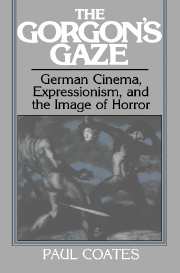Book contents
- Frontmatter
- Contents
- Preface
- Acknowledgments
- Introduction: The uncanny and the gorgon's gaze
- I Silent cinema and expressionism
- II The sleep of reason: Monstrosity and disavowal
- III Memory and repression in recent German cinema
- IV Expressionism in America
- V Elective affinities and family resemblances: For Margarethe von Trotta
- Appendixes
- 1 Melodrama contra the fantastic: Petro, Elsaesser, and Sirk
- 2 Early cinema, surrealism, and allegory
- 3 Modernism and the body as machine
- 4 The articulation of guilt in Broch's Der Versucher
- 5 Film noir, Macbeth, and murdered sleep
- 6 Dissolving the fear of the feminine: Wim Wenders
- Notes
- Selected bibliography
- Filmography
- Index
1 - Melodrama contra the fantastic: Petro, Elsaesser, and Sirk
Published online by Cambridge University Press: 21 October 2009
- Frontmatter
- Contents
- Preface
- Acknowledgments
- Introduction: The uncanny and the gorgon's gaze
- I Silent cinema and expressionism
- II The sleep of reason: Monstrosity and disavowal
- III Memory and repression in recent German cinema
- IV Expressionism in America
- V Elective affinities and family resemblances: For Margarethe von Trotta
- Appendixes
- 1 Melodrama contra the fantastic: Petro, Elsaesser, and Sirk
- 2 Early cinema, surrealism, and allegory
- 3 Modernism and the body as machine
- 4 The articulation of guilt in Broch's Der Versucher
- 5 Film noir, Macbeth, and murdered sleep
- 6 Dissolving the fear of the feminine: Wim Wenders
- Notes
- Selected bibliography
- Filmography
- Index
Summary
If the tendency of writing on Weimar film has been to focus on the fantastic and upon the implicit male spectator – be it the Oedipally defeated spectator of Kracauer or the poststructurally destabilized one of Thomas Elsaesser – a counterweight has been thrown into the balance recently in the form of Patrice Petro's Joyless Streets: Women and Melodramatic Representation in Weimar Germany. Petro's perspective is feminist and deeply indebted to Laura Mulvey, but the precise aim of her book is unclear; for although she claims that she is not seeking “to ‘correct the balance’ of film historiography, as it were, or simply to provide an account of the female subject to match existing accounts of the male subject during this period” (p. xxiv), her choice of films undermines this claim, for she brings to the fore melodrama – a term whose ambiguities she never discusses – and the Dirnentragödie: A canon appealing primarily to female spectators is placed under analysis. Despite Petro's apparent wish to overthrow Kracauer's master narrative, all her selection does is indicate his failure to tell the whole story. A truly radical attempt to overturn the male bias Petro discerns in Weimar film historiography would address the films on which the accepted critical narrative of Oedipal defeat has been based: The Student of Prague, Caligari, Nosferatu, Waxworks, Metropolis, and so on.
- Type
- Chapter
- Information
- The Gorgon's GazeGerman Cinema, Expressionism, and the Image of Horror, pp. 229 - 236Publisher: Cambridge University PressPrint publication year: 1991
- 1
- Cited by

